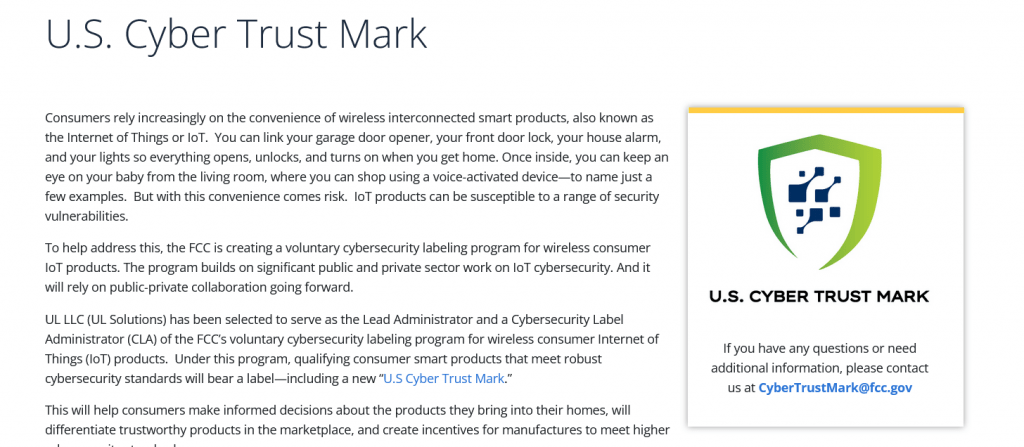In a move aimed at bolstering consumer cybersecurity, the Federal Communications Commission (FCC) has introduced the U.S. Cyber Trust Mark program. This voluntary initiative focuses on helping consumers identify Internet of Things (IoT) devices that meet stringent cybersecurity standards, while also incentivizing manufacturers to adopt best practices. However, some restrictions apply, especially concerning products from certain foreign entities, including those tied to Chinese companies.

Addressing IoT Security Risks
Smart devices, from home security cameras to fitness trackers and smart appliances, have become staples of modern life. While offering unprecedented convenience, these devices also present significant cybersecurity risks, making them vulnerable to hacking and other attacks.
The Cyber Trust Mark program aims to mitigate these risks by providing a label that indicates a product’s compliance with robust cybersecurity standards. FCC Chairwoman Jessica Rosenworcel highlighted the initiative’s importance, stating, “This program not only helps protect consumers but also creates incentives for manufacturers to prioritize cybersecurity.”
How the U.S. Cyber Trust Mark Works
The U.S. Cyber Trust Mark will function similarly to the ENERGY STAR label for energy efficiency, providing consumers with a clear indicator of a product’s security credentials. Key features of the program include:
- Labeling and Transparency:
- Products bearing the Cyber Trust Mark will display a logo and a QR code.
- The QR code will link to detailed security information, such as:
- Instructions for changing default passwords.
- Steps for secure device configuration.
- Information on automatic software updates and patching.
- The product’s minimum support period.
- Voluntary Participation:
- Manufacturers are not required to participate but must meet rigorous standards to use the label.
- Accredited CyberLABs will test and verify compliance with cybersecurity requirements.
- Consumer Benefits:
- The label empowers consumers to make informed choices about the devices they bring into their homes.
- It promotes safer smart home environments by encouraging the use of secure devices.
- Public-Private Collaboration:
- The program relies on partnerships between the FCC and private entities, with third-party administrators managing day-to-day operations, such as evaluating applications and approving label use.
Restrictions on Foreign Manufacturers, Including Chinese Companies
While the Cyber Trust Mark program is open to manufacturers globally, certain restrictions apply, particularly to entities linked to national security concerns. This includes some Chinese companies, as well as others on federal security risk lists.
Specific Restrictions:
- Companies on the FCC’s Covered List, such as Huawei and ZTE, are excluded due to their potential ties to the Chinese government and military.
- Manufacturers on the Department of Commerce’s Entity List or the Department of Defense’s List of Chinese Military Companies are also prohibited.
- Entities banned from federal procurement or identified as national security risks are ineligible to participate.
Why Are Chinese Products Restricted?
The U.S. government has raised concerns over the potential misuse of IoT devices by certain Chinese companies for espionage or other malicious purposes. These restrictions ensure that devices bearing the Cyber Trust Mark come from trusted manufacturers, safeguarding consumer privacy and national security.
Eligible Chinese Manufacturers
Not all Chinese manufacturers are excluded. Companies that operate independently of the aforementioned restrictions can still apply for the Cyber Trust Mark. They must meet the same rigorous cybersecurity requirements as U.S.-based manufacturers, ensuring their devices are secure and trustworthy.
Eligible and Excluded Products
The Cyber Trust Mark program focuses on consumer wireless IoT devices, including:
- Smart home security cameras.
- Voice-activated shopping devices.
- Fitness trackers and baby monitors.
- Smart home appliances.
Excluded categories include:
- Medical devices regulated by the FDA.
- Motor vehicles under the National Highway Traffic Safety Administration’s jurisdiction.
- Wired devices and enterprise-grade IoT products.
- Devices produced by entities on federal security risk lists.
Benefits for Consumers and Manufacturers
The Cyber Trust Mark program offers significant advantages:
- For Consumers: Transparency in IoT device security, empowering safer purchasing decisions.
- For Manufacturers: A competitive edge in a market increasingly concerned with privacy and cybersecurity.
“Just as ENERGY STAR reshaped the appliance market by educating the public about energy efficiency, the Cyber Trust Mark will pave the way for safer, smarter products,” an FCC spokesperson explained.
Next Steps and International Potential
The FCC is finalizing program details, including standards, testing procedures, and label designs. Public input continues to shape the initiative, with announcements expected as the program approaches its 2025 rollout.
The FCC also aims to achieve international recognition for the Cyber Trust Mark, fostering global cybersecurity standards. As the program evolves, additional product categories and updates may be introduced to address emerging challenges.
Conclusion
The U.S. Cyber Trust Mark represents a significant step toward securing the IoT ecosystem. By combining transparency, education, and stringent standards, the FCC’s initiative empowers consumers while promoting a more secure digital landscape.
Although some foreign manufacturers, particularly certain Chinese companies, are restricted from participation, the program remains open to global players willing to meet its high standards. This balance between security and inclusivity ensures that consumers can trust the devices they bring into their homes.
For more details on eligibility or to stay updated on the program’s rollout, visit the FCC’s official Cyber Trust Mark webpage or contact CyberTrustMark@fcc.gov.

Information security specialist, currently working as risk infrastructure specialist & investigator.
15 years of experience in risk and control process, security audit support, business continuity design and support, workgroup management and information security standards.











